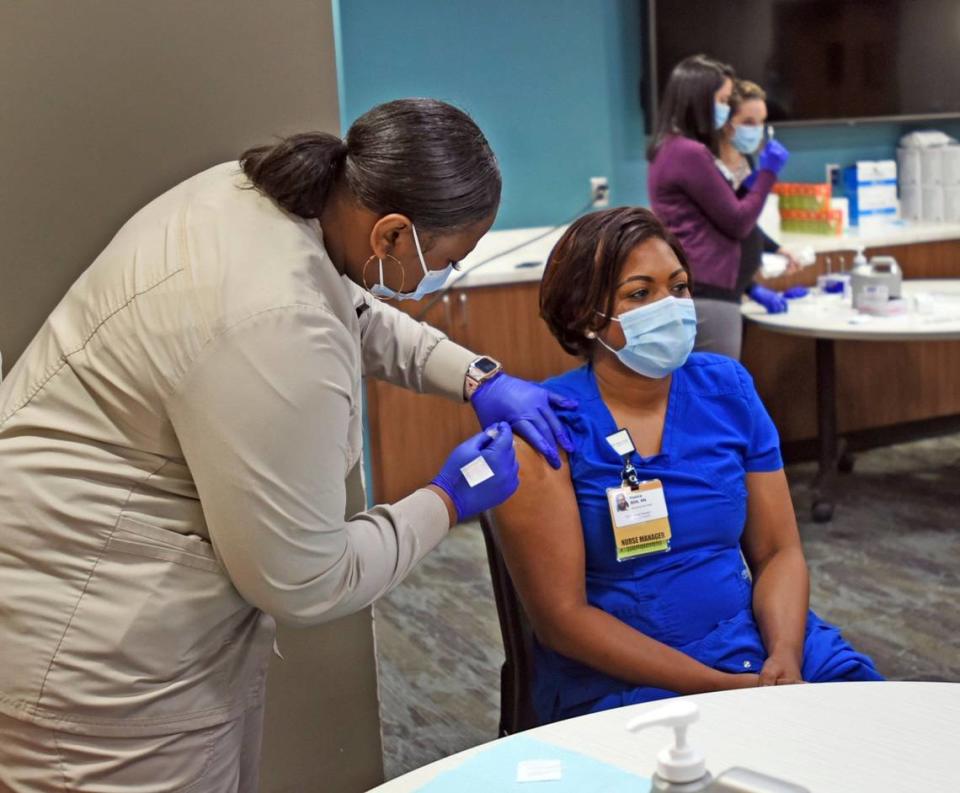Many bosses won’t mandate COVID vaccine, poll says. They’re scared of worker backlash
As more vaccines for COVID-19 are approved and supplies grow, businesses across North Carolina are beginning to reckon with a dicey question: Do we require our employees to get vaccinated?
The first vaccines for COVID-19 have arrived in North Carolina. Medical professionals in Charlotte and Raleigh are getting the shots. But supplies are limited and mass vaccination remains far off. Still, once more doses are available, employers are likely to be thrust into a bind between wanting to prevent the virus and not provoking employee backlash.
It’s entirely legal for a business to require a vaccination, including for COVID-19, provided that religious and medical accommodations are made, according to health experts and lawyers. But whether employers will actually do that is another question altogether.
Statewide, North Carolina doesn’t plan to require COVID-19 vaccination, according to Amy Adams Ellis, a spokeswoman for Dr. Mandy Cohen, Secretary of the N.C. Department of Health and Human Services. That means that if any requirements are put in place, it will happen below the state level, or by employers. Some businesses could make a vaccine a requirement of employment, Ellis added.
Only 5% of North Carolina businesses plan to mandate vaccination in order to work in-person, according to an informal survey of about 500 businesses conducted this month by human resources groups in the state. About 45% said they wouldn’t require a jab, and the rest were undecided.
Why wouldn’t businesses require a vaccine that much of the nation has been waiting for? Fear of employee backlash, according to Kenny Colbert, president and CEO of The Employers Association, a Charlotte-based human resources firm that helped conduct the survey.
Polls show a wariness to taking a COVID-19 vaccine. Reasons for opposition vary widely from a simple wait-and-see approach to conspiracy theories about what’s in the shot. Some are frightened of the rare instances of severe side effects from it. That’s led to a fear that, if required to inoculate, many will attempt to use available exemptions.
“Do you really want a line at the door of the HR department claiming exemptions?” Colbert said. “I think deep down a lot of companies would like to make it mandatory, though.”
Most businesses likely will strongly encourage their employees to take the vaccine once it’s available, but making it mandatory is much more thorny, according to Tory Summey, a Charlotte-based employment lawyer at the firm Parker Poe.
It’s likely that requirements will differ from industry to industry, he said, with health care companies much more likely to mandate vaccination than tech, for example.
“I have had health care providers reach out and say ‘This is really important, how do we do this?’ ” Summey said.

Finding religion
North Carolina has reported over 460,000 confirmed cases of COVID-19 since the first case in the state was identified in March. Over 6,000 have died from the disease in the state. More than 310,000 have died from the disease nationwide. Those numbers have all jumped in recent months as a new wave of infections swept the country.
At present, with the only vaccine available approved on an emergency basis, “I think few would insist that people get their vaccine,” said Dr. David Weber, medical director of hospital epidemiology and associate chief medical officer of UNC Health Care in Chapel Hill.
There still isn’t complete data on the safety of the vaccine for immunocompromised people and pregnant women, Weber said. Additionally, it’s not yet clear how long the shots are effective. That makes it difficult and unlikely for employers to currently mandate vaccination. Weber received the first stage of the Pfizer and BioNTech vaccine this past week, which was given emergency approval by the U.S. Food and Drug Administration on Dec. 11.
“If it turns out to be safe and effective — for the immunocompromised and for pregnant women — the groups that have been most common to have vaccines requirements, hospitals and medical centers, would likely opt for that.” Weber said.
Schools and potentially universities will likely consider making vaccination a condition of physically coming to school, but those decisions are at least half a year away, he said.
One potential middle ground for businesses: strongly endorse the vaccine, but don’t mandate it. Phillip Strach, a Raleigh-based employment lawyer at Ogletree Deakins, says that he would advise employers to offer bonuses or extra time off for taking the vaccine.
“There are going to be some businesses that are going to make it mandatory for some reason,” Strach said. “Any smart employer will have thought this through in advance and will have a solid written justification.”
Who has the vaccine right now?
Health care workers have been prioritized by North Carolina to receive COVID-19 vaccinations first. Charlotte’s largest hospital system, Atrium Health, was the first NC hospital to administer the vaccine.
But neither Atrium nor its private competitor Novant Health will require employees to get the coronavirus vaccination at the moment — though both hospital systems already do require employees to get the flu vaccine. The hospitals have only started vaccinations for some employees this past week, and policies are likely to change as supplies grow.
“Anytime there’s a vaccine that could be life-saving and protecting our patients, we will certainly consider the idea of requiring it at some point,” Dr. David Priest, Winston-Salem-based infectious disease expert at Novant Health, told reporters Tuesday. “But we’re not at that stage yet.”
But doctors at both hospital systems say they expect to see many employees voluntarily take the vaccine.
Atrium’s Dr. Katie Passaretti, who became the first person in the state to get the FDA-approved vaccine last Monday, called the experience “a moment of hope,” and later told reporters she had no side effects from the vaccine. Neither had UNC’s Weber.
Observer reporter Hannah Smoot contributed.

 Yahoo News
Yahoo News 
